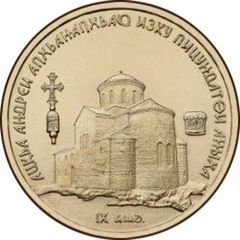War in Abkhazia: Gagra, Georgia – Visiting Hours, Tickets, and Historical Significance
Date: 14/06/2025
Introduction: Gagra’s Role in the War in Abkhazia and Its Enduring Legacy
Set against the dramatic backdrop of the Black Sea and the rising slopes of the Caucasus, Gagra stands as both a testament to the region’s natural splendor and its turbulent 20th-century history. Once a celebrated Soviet resort town, Gagra became a focal point during the War in Abkhazia (1992–1993), a conflict that profoundly shaped the region’s demography, infrastructure, and identity. Today, Gagra offers visitors a rare opportunity to engage with Abkhazia’s layered history—through preserved architecture, poignant war memorials, and a vibrant, if resilient, local culture.
Traveling to Gagra requires both logistical preparation and cultural sensitivity. Visitors must navigate political complexities, secure appropriate permits, and remain aware of ongoing security considerations. For those who do, Gagra rewards with stunning beaches, lush parks, evocative ruins, and a chance to witness first-hand the intersection of past and present in one of the Caucasus’s most fascinating locales.
For further reading and travel advisories, see sources such as Kavkaz Uzel, Young Pioneer Tours, and Travel.gc.ca.
Contents
- Introduction: Gagra’s Historical Significance
- The War in Abkhazia (1992–1993): Gagra’s Role and Impact
- Key Historical and Cultural Sites
- Visiting Hours, Ticket Information, and Accessibility
- Transportation, Accommodation, and Practical Tips
- Top Attractions and Activities
- Safety, Security, and Responsible Tourism
- Guided Tours and Special Experiences
- Photography and Exploration
- Frequently Asked Questions (FAQ)
- Conclusion: Planning Your Trip
- References and Further Reading
The War in Abkhazia (1992–1993): Gagra’s Role and Impact
Historical Context
The dissolution of the Soviet Union in 1991 led to deepening tensions between Georgian and Abkhaz communities. On August 14, 1992, Georgian forces entered Abkhazia to reassert control over the region. Gagra, with its strategic coastal location near the Russian border, became a critical battleground. In October 1992, Abkhaz forces, supported by weapons from a Russian base, retook Gagra, marking a pivotal shift in the conflict (Kavkaz Uzel).
The war was characterized by severe humanitarian violations, including ethnic cleansing and mass displacement, with Gagra experiencing significant devastation and demographic upheaval (Kavkaz Uzel). Today, traces of this conflict are visible in the town’s architecture, memorials, and collective memory.
Significance of Gagra
Gagra’s capture enabled Abkhaz forces to secure crucial supply routes and push further towards Sukhumi, altering the course of the war. The town’s Soviet-era grandeur, now marked by war-damaged hotels and sanatoriums, serves as a reminder of both its heyday and the scars of conflict (Kavkaz Uzel).
Key Historical and Cultural Sites
- War Memorials and Monuments: Throughout Gagra, visitors will find memorials and plaques commemorating the events and victims of the 1992–1993 conflict.
- Soviet-Era Sanatoriums: Once elite resorts, many are now abandoned or partially restored, offering a window into both the Soviet past and the realities of post-war recovery.
- Psou River Border Area: This symbolic crossing marks both the contemporary administrative boundary and a site of historic significance during the conflict.
- Prince of Oldenburg’s Palace and Gagra Colonnade: Iconic architectural landmarks reflecting the town’s imperial and Soviet heritage.
Visiting Hours, Ticket Information, and Accessibility
- General Opening Hours: Most attractions are open daily from 9:00 AM to 6:00 PM. Some may close earlier or later depending on the season, so verify details locally.
- Admission Fees: Outdoor sites and beaches are generally free. Entry to certain museums or historic buildings (e.g., Prince of Oldenburg’s Palace) costs approximately $3 USD. Guided tours may carry additional fees (Kutrubes Travel).
- Accessibility: Infrastructure varies. Some newer hotels and public buildings have limited accessibility features; older sites and ruins may be challenging for those with mobility issues. Contact operators in advance for specific requirements.
Transportation, Accommodation, and Practical Tips
Entry Requirements and Border Crossings
- Entry Route: Foreign visitors must enter Abkhazia via Russia, crossing at the Psou checkpoint near Sochi. Entry through Georgian-controlled territory is prohibited and may result in legal consequences (Wikipedia; Travel.gc.ca).
- Visa and Permits: Obtain an Abkhazian entry permit in advance (usually online), then exchange it for a visa in Sukhumi (Tourist Secrets).
- Documentation: Carry your passport, visa, and permit at all times.
Getting Around
- Transport: Trains run from Sochi to Gagra and Sukhumi; marshrutkas and taxis are available locally (Wikipedia).
- Private Hire: Hiring a driver or private vehicle is recommended for flexibility and accessing remote sites.
Accommodation and Dining
- Options: Ranging from Soviet-era hotels to guesthouses; book early in summer months (Wikipedia).
- Cuisine: Sample local Abkhaz dishes, fresh seafood, and regional wines in local cafes and restaurants (Discover Abkhazia).
Top Attractions and Activities
- Beaches and Promenades: Relax on uncrowded pebble beaches and stroll palm-lined avenues with panoramic Black Sea views.
- Lake Ritsa: A mountain lake famed for its scenery, hiking trails, and Stalin’s historic dacha.
- Botanical Gardens and Parks: Explore Gagra’s subtropical flora and lush green spaces.
- Nearby Destinations: Visit Sukhumi’s museums, New Athos Monastery and caves, Gega Waterfall, and Krubera Cave (Discover Abkhazia; Georgian Travel Guide).
Safety, Security, and Responsible Tourism
- Travel Advisories: Most Western governments advise against travel to Abkhazia due to unresolved conflict and lack of diplomatic support (Travel.gc.ca; Travel.State.Gov).
- Security: Russian military presence ensures stability, but landmines remain a risk in rural areas—stick to marked paths.
- Healthcare: Medical facilities are basic; comprehensive travel insurance is essential (SafeTravel NZ).
- Respectful Conduct: Avoid political discussions unless invited; be sensitive when visiting war memorials.
Responsible Tourism
- Support Local Businesses: Stay in locally owned guesthouses, eat in family-run restaurants, and use local guides (Discover Abkhazia).
- Environmental Awareness: Dispose of waste properly and minimize your impact on natural sites.
- Cultural Etiquette: Dress modestly in rural or religious areas; ask before photographing people, especially in sensitive settings.
Guided Tours and Special Experiences
Tour operators such as Young Pioneer Tours and Kutrubes Travel offer historical and cultural tours, nature excursions, and culinary experiences. Prices start around $50 per day; booking ahead is recommended.
Photography and Exploration
Gagra’s scenic coastline, historic ruins, and mountain backdrops provide exceptional opportunities for photography. Popular spots include the Colonnade at sunset, Lake Ritsa, and the old sanatoriums. Exercise caution in abandoned buildings and respect local guidelines regarding sensitive sites.
Frequently Asked Questions (FAQ)
Q: What are the visiting hours for Gagra’s main attractions?
A: Most are open from 9:00 AM to 6:00 PM; check locally for seasonal variations.
Q: How do I get tickets for attractions?
A: Many are free; tickets for palaces and museums can be purchased onsite or via local tour operators.
Q: Is Gagra safe for tourists?
A: The town is generally safe, but heed government advisories and avoid rural areas with landmine risks.
Q: How do I reach Gagra?
A: Enter via Russia at the Psou border; direct entry from Georgia is not permitted.
Q: Are there accommodations for travelers with disabilities?
A: Limited; contact your hotel or tour operator in advance.
Q: When is the best time to visit?
A: From May to October, when the weather is warm and the sea is inviting. Monitor for weather-related disruptions.
Conclusion: Planning Your Visit to Gagra
Gagra is a destination where history, culture, and nature converge. By preparing carefully, respecting local customs, and utilizing resources such as the Audiala app, visitors can enjoy a safe and memorable journey through this remarkable corner of Abkhazia. Whether you are exploring war memorials, lounging on the beach, or hiking to Lake Ritsa, Gagra offers a travel experience rich in meaning and beauty.
For the latest updates, detailed guides, and tour bookings, visit our website, download the Audiala app, and follow us on social media.
References and Further Reading
- Exploring Gagra: A Visit to Abkhazia’s Historic Coastal City and War Memorial Sites, 2025 (Young Pioneer Tours)
- Visiting Gagra: History, Tourist Tips, and Key Sites in Abkhazia, 2025 (Tourist Secrets)
- Visiting Gagra: Post-War Attractions, Tourist Tips, and Historical Sites in Abkhazia, 2025 (Abkhaz World)
- Gagra Visiting Hours, Tickets & Travel Guide to Abkhazia’s Historic Black Sea Resort, 2025 (Wikipedia)
- Kavkaz Uzel, 2025, ‘How the War in Abkhazia Began in 1992’
- Travel.gc.ca, 2025, Government of Canada Travel Advice for Georgia and Abkhazia
- Travel.State.Gov, 2025, US Department of State Travel Advisory for Georgia
- Discover Abkhazia, 2025, Travel and Cultural Guide
- Abkhaz World, 2025, Disaster Aftermath and Updates

